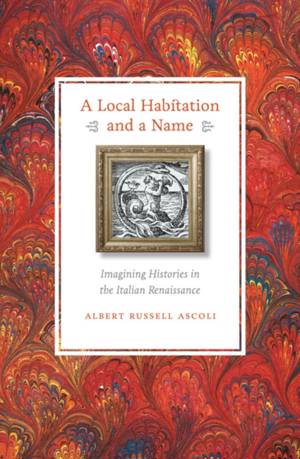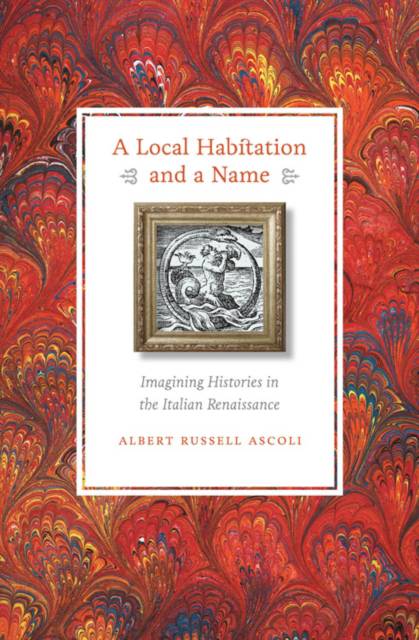
En raison d'une grêve chez bpost, votre commande pourrait être retardée. Vous avez besoin d’un livre rapidement ? Nos magasins vous accueillent à bras ouverts !
- Retrait gratuit dans votre magasin Club
- 7.000.000 titres dans notre catalogue
- Payer en toute sécurité
- Toujours un magasin près de chez vous
En raison de la grêve chez bpost, votre commande pourrait être retardée. Vous avez besoin d’un livre rapidement ? Nos magasins vous accueillent à bras ouverts !
- Retrait gratuit dans votre magasin Club
- 7.000.0000 titres dans notre catalogue
- Payer en toute sécurité
- Toujours un magasin près de chez vous
A Local Habitation and a Name
Imagining Histories in the Italian Renaissance
Albert Russell Ascoli
Livre relié | Anglais
185,45 €
+ 370 points
Description
Focusing on major authors and problems from the Italian fourteenth and sixteenth centuries, from Petrarch and Boccaccio to Machiavelli, Ariosto and Tasso, A Local Habitation and a Name examines the unstable dialectic of realityand imagination, as well as of historyand literature. Albert Ascoli identifies and interprets the ways in which literary texts are shaped by and serve the purposes of multiple, intertwined historical discourses and circumstances, and he equally probes the function of such texts in constructing, interpreting, critiquing, and effacing the histories in which they are embedded. Throughout, he poses the theoretical and methodological question of how formal analysis and literary forms can at once resist and further the historicist enterprise. Along the way Ascoli interrogates the mechanisms of historical periodization that have governed for so long our study of what is sometimes called the Renaissance, sometimes the early modern period. He also addresses the period's own unstable version of the literature/history opposition, the place of gendered discourse in the construction of historical narratives (and vice versa), the elaborate formal strategies by which poets and intellectuals negotiate their relations to power, and, finally, the way in which proper names (of authors, works, and exemplary characters) serve as points of negotiation between individual identity and social order in the Renaissance. The book brings to culmination two decades of a major scholar's thinking about some of the most important figures and questions that shaped the Renaissance, with emphasis on the question of history, both the historical context of literature and the writing of literary history
Spécifications
Parties prenantes
- Auteur(s) :
- Editeur:
Contenu
- Nombre de pages :
- 384
- Langue:
- Anglais
Caractéristiques
- EAN:
- 9780823234288
- Date de parution :
- 01-09-11
- Format:
- Livre relié
- Format numérique:
- Ongenaaid / garenloos gebonden
- Dimensions :
- 150 mm x 231 mm
- Poids :
- 612 g

Les avis
Nous publions uniquement les avis qui respectent les conditions requises. Consultez nos conditions pour les avis.






